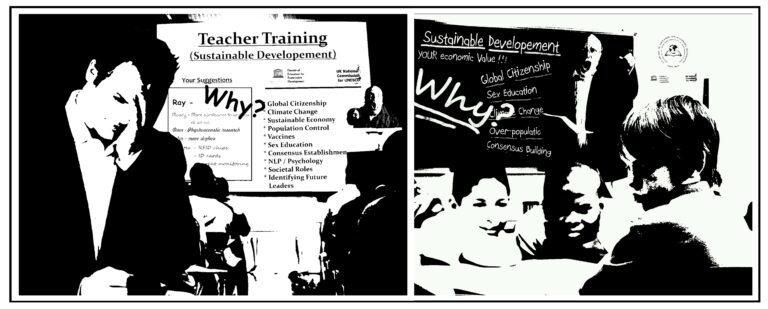The United Nations Decade of Education for Sustainable Development (2005-2014), led by UNESCO, aims to develop the principles, values and practices of sustainable development to address socio-economic issues. We aim to integrate it into all aspects of teaching and learning. Cultural and environmental issues facing us in the 21st century – UNESCO Education for Sustainable Development
John Rawlings Rees, Tavistock Institute, Brainwashing, Propaganda, 5th Columnist
Travel back in time to the 1940s and you'll find a chilling quote from John Rawlings Rees, president of the Tavistock Institute and World Federation for Mental Health, in 1948. Summary of speech given at the annual meeting of the National Council on Mental Hygiene, June 18, 1940). In his speech, Mr. Rees pointed out that:
“We have made very useful attacks on many professions, of which the two easiest are of course the teaching profession and the church, and the two most difficult are law and medicine. Anyone who can go back even a year can realize how great a change has been brought about in the way people look at their profession.If we want to penetrate other people's professional and social activities, If so, I think we have to imitate them. Organizing 5-column activities…We feel that we need a long-term propaganda plan because our work is often too spontaneous.
Brainwashing and propaganda in the American education system
In the Utube video at the bottom of this page, Michael Chapman ed watch It details the brainwashing happening throughout the American school system. This includes programming to allow children to define their own truth through historical revision, child group think, consensus building, and “constructivism.” Does 2 + 2 really equal 4? Ed Watch shines a light on the virulent educational curriculum born out of the United Nations UNESCO and implemented in every school in America. From historical revision to misrepresentation of the U.S. Constitution, children are being deliberately neglected under UNESCO's Education for Sustainable Development (ESD) initiative.
UNESCO propaganda and brainwashing in the UK
If you thought Michael Chapman's presentation had nothing to do with parents and their children in the UK, you will be disappointed.
England UNESCO commission Located in Westminster, London. According to ESD in the UK in 2008: Action research, United Nations Decade of Education for Sustainable Development 2005-2014published by the UK National Commission for UNESCO. Non-governmental organizations (NGOs) involved in ESD include WWF-UK, Forum for the Future, Groundwork, Oxfam, The Royal Society for the Protection of Birds (RSPB), and Campaign to Protect. Rural England, Greenpeace, Friends of the Earth, Common Purpose, Yorkshire and Humber Global Schools Association and others.
Long working hours, stress, family separation, and decisions to keep children out of school mean parents are increasingly disengaged from helping their children develop their minds and personalities, while their tax dollars are used to support government funding. being used. It is an educational program that destroys critical thinking, creativity, and exploration. The result is a powerful behavior change program that relies heavily on peer pressure and self-worth appraisals to gain conformity in the classroom. Peer pressure doesn't just come into play within the classroom, as children are encouraged to persuade their parents to adopt “healthy” green habits (and donate generously to charity). It is also brought into the home.
There are many teacher training providers. Sustainability and Environmental Education (SEED); It is dedicated to sustainable development and preparing the school's capacity to implement United Nations agreed practices. Citizenship is also essential to maintain compatibility among students. Citizenship lessons have been part of the curriculum since 1999 and are included in all Secondary schools will be ready to teach this subject by September 2002.
Citizenship was introduced as a statutory subject in the UK National Curriculum in 2001. This follows recommendations contained in the report. Citizenship education and democracy education in schools1998 Report, also known as the Crick Report.The United Nations Matters – Teacher's Handbook' provides comprehensive coverage of important parts of the citizenship curriculum in the UK, and also provides the eight key concepts of the Global Dimension (DFID, DfES et al., 2005 guidance 'School Curriculum Global Dimension Development”). – sustainable development, conflict resolution, interdependence, diversity, human rights, social justice, global citizenship, values and awareness – thereby preparing students to be active and engaging global citizens . This pack also includes elements of the British Geography curriculum.
The Right to Think (UNICEF UK) A school resource pack for ages 11-16. This is based on the students' previous experience working with the United Nations Convention on the Rights of the Child (CRC). This activity supports citizenship education, is in line with the approach of children's philosophy, and addresses various aspects of personal and citizenship education. Activities include drama and role play. This activity encourages children to be more rational, that is, to be “ready to think and reason logically.” You can read more about this “philosophy for children” approach at: http://sapere.org.uk/
The UK UNESCO Committee has published a 60-page document.Education for sustainable development in the UK” September 2010.


